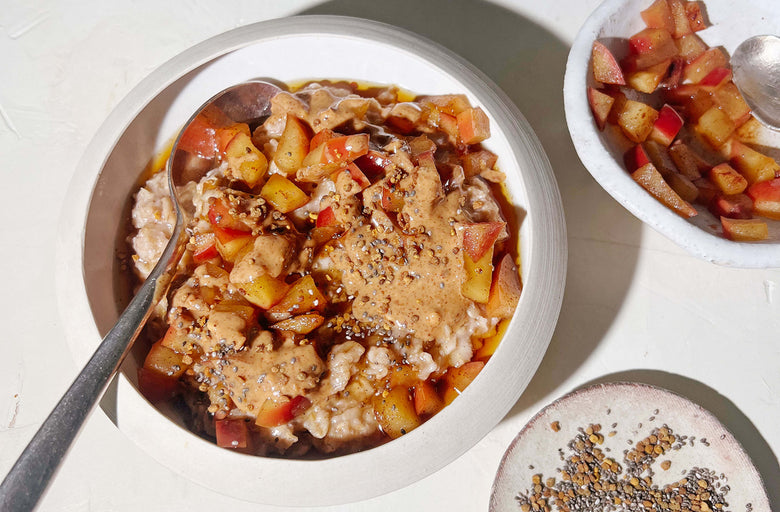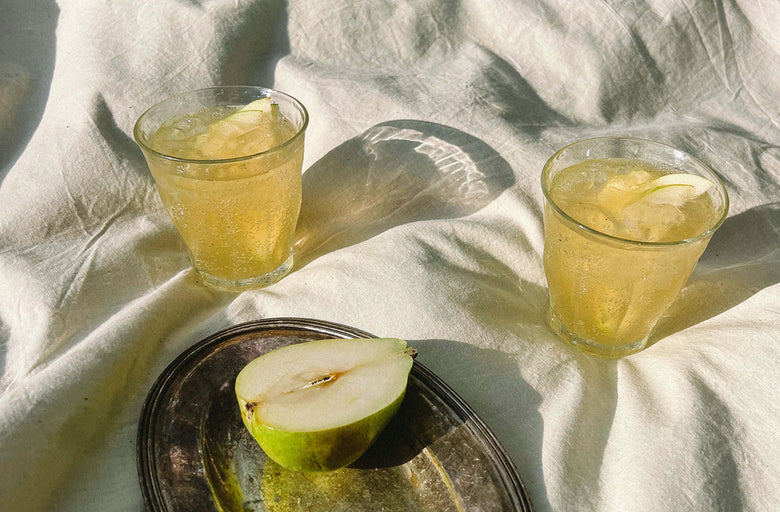Protein is a macronutrient with a lot of buzz, and it’s easy to get lost in an internet spiral searching how much satisfies the quota for “enough.” Adding to the confusion is the misunderstanding that the most satiating, potent sources of protein must come from animals—to which it’s important to remember that the strong ox munches on grass to maintain his own muscular structure. Documentaries like What the Health or books like The China Study unpack the push on meat and dairy as the "best" way to get protein and reveal it as mostly rooted in propaganda from the livestock industry. To clear things up: the body doesn’t make muscles from protein directly. Instead, muscles require the support and nourishment from amino acids. These 20 compounds—11 of which are made by the human body, nine of which must be obtained through food and therefore deemed essential—can all be found in plants. They build hormones, are necessary for phase II liver detoxification, fuel ATP production for energy, make hemoglobin and antibodies, and repair muscle tissue as it breaks and builds from physical activity like pilates or strength training.
In your own quest to support lean muscles and balanced hormones, it’s critical to understand how and where you’re getting your protein sources, and to keep quality top of mind.
Low-Quality Protein Creates a Higher Toxic Load
The body requires clarity when synthesizing food everyday; the cleaner the food source, the better it can transmute the nutrients— so pick ones designed for longevity, instead of disease. Unfortunately, low-quality protein from today’s animal sources are culprits for halting the body’s natural rhythms. That’s the dilemma with eating animal-based foods: you’re not just eating that whey protein or beef gelatin, but also whatever the animal ate during its life. Given the state of factory farming in the U.S., that’s likely genetically modified and pesticide-ridden corn, soy, and wheat (along with nitrates, casein, and aflatoxins)—all of which can cause harmful inflammation in the human body. Acidic foods like meat and dairy create an immune response in the body to overproduce mucus. In proper amounts, this mucous helps to protect from bacteria entering the bloodstream; in excess, this sticks to the intestinal walls and prevents nutrient absorption. Plus, toxins accumulate in adipose tissue, which is abundant in these animals who are bred to be much bigger than they naturally are.
The Missing Link: Minerals + Micronutrients
When the goal is to ingest amino acids in order to build a strong, thriving body, obtaining it through organic, non-GMO plants allows you to receive all the essential nine, plus so much more. You end up nourishing with the most bioavailable sources of micronutrients and fiber on the planet. Meat and dairy, and even many non-organic plants, cannot boast the same. For example: zinc, selenium, and B vitamins—abundant in plant sources like pumpkin and sesame seeds—are critical to stimulate hydrochloric acid in the stomach and absorb nutrients, while regulating the epithelial wall (the fragile tissues protecting your organs and gut). Maintaining your own stores of collagen require polyphenols, vitamin C, and sulfurous vegetables, which also happen to be found in plants stacked in amino acids like leafy greens, wheatgrass, and beans. To build resilient bones, skin, and teeth, the body needs vitamin D, vitamin K, and calcium—their most bioavailable forms found in organic plant sources like mushrooms and pea protein. Iron, which was often touted to be most prevalent in red meat, is found in high-fiber foods and sources like hemp seeds and spirulina.
it’s critical to understand how and where you’re getting your protein sources, and to keep quality top of mind
Build a Thriving Body with Plants:
Armed with the wisdom of how amino acids interact within the body— and how the nine require accompanying vitamins, phytonutrients, and minerals to properly flood the systems and work—meet the Protein + Greens Super Powder. This supplementary protein powder prioritizes bioavailability and nutrient-density above all else. Combining four sources of organic, grain-free, 100% plant-based foods—pumpkin, hemp, sesame, and pea— with algae and grasses that alkalize the body, it provides important sources of chlorophyll and minerals. Chlorella and spirulina are both potent sources of amino acids, while also including brain-boosting essential fatty acids and a whole serving of greens. Spirulina, specifically, is composed of 60% protein––the highest of any natural food.
This versatile powder can be folded into a smoothie, “bliss ball”, and even turned into a cracker. When incorporated as part of your weekday ritual, you can expect heightened energy, better focus, sustained satiation, and hormone support. The upgrade to an organic powder will also be a natural detox for your body, without having to resort to a juice cleanse or deprivation diet. Avoiding artificial sugars, pesticides, preservatives, fillers, and heavy metals will bolster the efficacy of these amino acids to the system, making the liver’s phase II detoxification much more seamless. Plus, a recent study revealed a single week eating organic can reduce levels of toxic pesticides in the body by a stunning 70 percent.

ON THE GO: Metabolism Protein Super Bar
The Metabolism Protein Super Bar is no ordinary protein bar; it's an edible supplement packed with 12 grams of food-based protein plus clinically-studied active ingredients, all made from plants. The combination of Atlantic brown seaweed and pomegranate seed oil is designed to activate stubborn fat stores and convert them into expendable energy, so your metabolism performs efficiently (88% of Americans are reportedly "metabolically ill") and you have sustained, soaring energy without a crash. These antioxidant-rich ingredients, combined with pea and brown rice protein, make this a protein-packed, portable snack that also happens to taste like a salted brownie, to boot.
OTHER ALLIES
To support lean muscles and create plump, taut skin, try these functional supplements.
Metabolism Super Powder’s key ingredient, horsetail, is an herbal fern that works as a diuretic and debloater. Its other superpower? It is a potent source of silica, a mineral created when oxygen and silicon combine. This is necessary for collagen synthesis and maintenance. Metabolism Super Powder also boasts the amino acid, L-glutamine, good for strengthening the integrity of your gut lining and taming years of chronic inflammation.
Beauty Water Drops provide 72 ionic minerals to help bolster the work of your detox organs as you combat the daily onslaught of external toxins and rid the body of cellular waste, bad bacteria, processed foods, and the like. These minerals work in tandem with amino acids to strengthen your muscles, bones, skin, and teeth.
The Foundation is an all-encompassing micronutrient regimen (in the form of convenient, daily supplement packs) that includes vitamins and minerals necessary to activate amino acids, support and repair muscles, bolster immunity, and protect collagen including chelated magnesium, iron, and vitamins B, C, and D.
DIVE DEEPER ON THIS IMPORTANT MACRONUTRIENT:
COLLAGEN, OMEGA-3, IRON... YES, YOU CAN GET IT FROM PLANTS
WHY YOU NEED GRASS, WEEDS, AND ALGAE IN YOUR DIET
7 WAYS TO TURN PROTEIN + GREENS SUPER POWDER INTO A SATIATING SNACK OR SMOOTHIE






